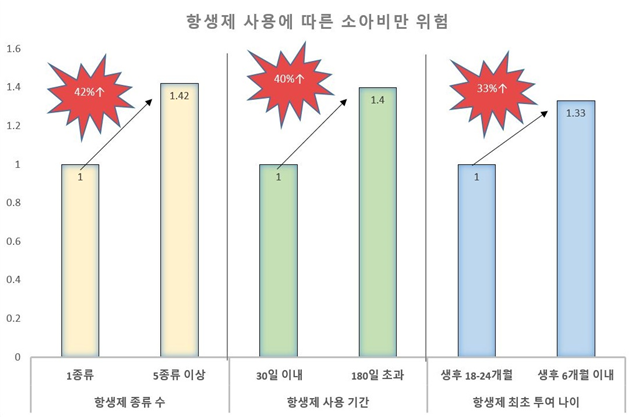Antibiotics Usage on Infants Can Lead to Childhood Obesity
-Research team at Seoul National University Hospital conducts a study based on 30,000 infant cases
-Risk chance increases according to the number of different types of antibiotics used, period of usage, and age of first-time usage
A recent study reveals that antibiotics usage should be done with special caution on infants younger than 24 months old.
The research team(Park Young-Joon, Jang Joo-Young) of Professor Park Sang-Min at the Department of Family Medicine, Seoul National University, presented the results of their research on observing 31,733 infants who had their health examinations between 2008 to 2012. The team analyzed the effects that antibiotics usage can have on infants younger than 24 months old, in relation to childhood obesity.
Childhood obesity can lead to not only high blood pressure, diabetes, and hyperlipidemia, but also metabolic syndrome. It is important to prevent it as 1 out of 3 cases of obesity in childhood will continue into adulthood.
According to the team’s research, factors that affect childhood obesity are the number of different types of antibiotics used, period of usage, and age of first-time usage. First, risk chances for childhood obesity increased respectively with the increase in the number of different types of antibiotics used. In cases where more than 5 different types of antibiotics were used, the risk chances for childhood obesity increased by 42%, compared to cases where only 1 type of antibiotics was used.
Risk chances also increased according to the period of antibiotics used; the longer the usage period, the greater the risk chance. In cases where antibiotics were used for more than 180 days, risk chances for childhood obesity increased by 40%, compared to cases where antibiotics were used for less than 30 days.
Another important factor is the age of first-time usage. In cases where the age of first-time usage was 6 months or younger, risk chances for childhood obesity increased by 33%, compared to cases where the age of first-time usage was between 18 to 24 months.

1 type 5 or more types Less than 30 days More than 180 days Between 18-24 months old Younger than 6 months old
Number of Antibiotics Types Period of Antibiotics Used Age of First-time Usage
Picture 1.
Risk Chances of Childhood Obesity Based on Antibiotics Usage.
Greater the number of different types of antibiotics used, longer the period of antibiotics used, and earlier the age of first-time usage, the greater the risk chances for childhood obesity.
Number of antibiotics types used, period of antibiotics used, and the age of first-time usage, all showed a dose-dependent relationship with childhood obesity. This means that, the greater the number of different types of antibiotics used, or longer the period of antibiotics used, increased the risk chances for child obesity. On the other hand, smaller the age of first-time injection, risk chances for child obesity increased. The research team argues that the reason for this tendency has to do with the intestinal microbial flora: antibiotics cause damages to the intestinal microbial flora, which induces obesity.
This research was conducted as a large-scale research using Korean infants as objects of study. Previous researches on the relationship between antibiotics and childhood obesity were done in countries abroad, but the research team’s study is the first study to use the specimen of Asian infants. In Korea, the prescription rate for antibiotics usage on infants younger than 24 months old, is approximately 99%. With this rate, there has also been the need for a serious study in this area. The research team also made sure to eliminate variables that could complicate their analysis, such as breast-feeding, infectious diseases, socioeconomic level, and so on.
According to Professor Park Sang-Min, “This study proved that there is a significant relationship between antibiotics usage and childhood obesity, based on a large-scale specimen of more than 30,000 infants”. Based on its results, “Doctors should prescribe antibiotics on infants with extra caution, carefully considering all pros and cons, so as to avoid overuse or misuse of antibiotics on infants”, he emphasized.
The research team’s study was presented in the recent volume of Metabolism: Clinical and Experimental, a prestigious international academic journal in the field of obesity and metabolism.